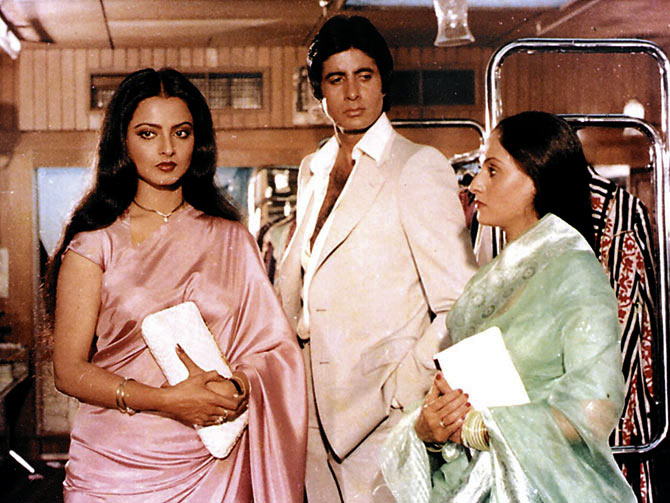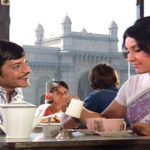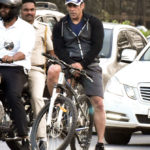‘Amitabh practised Rang Barse well; the singing, movements, everything. And he got the inflections perfectly.’
By 1980, when Yash Chopra launches Silsila, his composers (Hariprasad Chaurasia and Shivkumar Sharma) have established themselves worldwide as classical musicians who are masters of their instruments (the flute and the santoor)…
Given the twists and turns in the story, and Yash Chopra’s capacity for creating visual poetry, the film presented enough scope for songs.
Shivkumar Sharma goes back to the time when Silsila was being announced, and they had just been signed on as music directors for the film.
“There was a lot of criticism at the time, with people asking why classical musicians were being asked to score music; were we diluting our art for commercial reasons?
“We realised we had to rise to the occasion. We spent many sessions with Yashji, discussing situations, locations, story. He gave us the screenplay which we read carefully.
“We asked for two weeks, sat together at home and composed the songs. Sahir (Ludhianvi) was contacted to write the songs, but he was not able to fit himself into the schedule. So, after a lot of consideration, Javed Akhtar was taken on. It was his first assignment as a film (lyric) writer.”
Most directors may have hesitated before or worried after signing three new talents to work on the music, but Yash Chopra has decided to take the gamble.
He agrees to the large assortment of instruments that the music directors want. While the flute and the santoor have their pride of place in the compositions, the role of other instruments in creating the mood and melody is not ignored either.
Shiv-Hari now bring in their own innovations.
Hariprasad suggests Amitabh should sing. “Allahabad ka hai, use gava diya, jaise gale me haat dal ke,” he recollects.
The song they wanted him to sing was a Hori.
“Then Yashji suggested, ‘Ask his father to write the song, a UP-style Hori.’ We asked Amitabh, he was happy.
“Harivanshraiji was in Bombay at that time, so he was requested. Within an hour, the song was written, adapted from a song sung in rural UP.
“He wasted no time at all, especially since his son was to sing it,” Hariprasad says, laughing.
He remembers the hard work that Amitabh put in before the recording.
“He practised it well; the singing, movements, everything. And he got the inflections perfectly.”
Rang Barse, which is heard on every loudspeaker across India on Holi, has long outlived the film.
It is a dramatic moment in the film, where a slightly tipsy-with-bhang Amitabh throws caution to the winds and lets everyone within earshot know that he and Rekha are lovers.
The dramatic twist comes from the fact that both Jaya and Sanjeev are also listening to the Hori-ditty-turned-confession and squirming with embarrassment…
The other Amitabh song, Neela Aasman So Gaya, is tougher.
“We had planned two versions, one by Lata, the other by Amitabh. We gave him a low base so it would be easier and would also bring out the pathos in his voice. It worked.”
Incidentally, the song developed from a tune Amitabh was humming. Snatches from a song reportedly shared by Shammi Kapoor.
In the master flautist’s words, “I liked the sound of the tune, told him to sing it to us and developed it into a full-fledged song.”
Shivkumar Sharma has a story to tell on the duet, Yeh Kahan Aa Gaye Hum.
“It was not a song situation at all; Yashji wanted words, poetry, set to music. We suggested a song and that poetic verses come in between the song, instead of interlude music. First the sthayi, then the recitation, then the antara, then words again.”
The suggestion worked.
Yash Chopra shot a hauntingly beautiful sequence with the santoor throbbing in the background before the other instruments join in; the music and lyrics adding layers of emotion as the poetic words speak of the hero’s sense of hopelessness and despairing love.
The words, spoken by Amitabh in his deep baritone drenched with emotion, made theatre-goers wonder if he was speaking of his own life.
The verses he was reciting, of course, were also by Javed Akhtar, excerpted from Banjara, his collection of poems.
When the director needed to give Jaya a song, he decided on a Meera bhajan, Jo Tum Todo Piya.
“He wanted Lataji to sing it of course; she sang in all his films.
“I told Yashji, ‘Lata may not sing this song, she has decided not to sing Meera bhajans except for her brother Hridaynath’s compositions’.”
“Yashji said, ‘Let’s see’.”
“So we went ahead and composed the tune. We kept it classical, in Bhairavi…”
Shiv-Hari are recording Dekha Ek Khwab for Silsila.
They are aware that the song is picturised on Amitabh and Rekha, who are cavorting among the breathtaking tulip gardens of Keukenhof in the Netherlands, alternating with the misty landscape of Pahalgam, Kashmir.
The tune is light, romantic, the 70-piece orchestra is in perfect sync, and Kishore Kumar and Lata Mangeshkar are giving it just the right lift with their voices.
Song over, the directors sit back to listen, to see if everything sounds the way they want it to. They know it will, but as first-time music directors and for a big banner at that, there is no harm of course in being doubly sure.
It is Lata’s habit to leave immediately after her recording. Her days are so busy, she cannot but do so. And anyway, over the years, she has sung and recorded enough songs to know that it has gone just right.
But today, she is still in the studio. She seems relaxed as she listens to the playback. All through.
If Hariprasad or Shivkumar are surprised, they do not show it. Instead, they realise they have been presented with an opportunity.
‘Was it good?’ they ask Lata, though they are sure of her response. The singer says she likes the song. That is when Shivkumar takes his chance.
‘There is another song we would like you to sing. It is filmed on Jayaji, and is a dramatic moment in the film. But,’ he adds, ‘it is a Meera bhajan. We have composed the tune in Bhairavi.’
To their surprise and delight, Lata agrees to sing it. It is perhaps the only time she made a concession and broke her self-imposed diktat about Meera bhajans…
The song was clipped out of the film before release, but was retained in the records.
Silsila marks the beginning of a long relationship between Yash Chopra and Shiv-Hari. It also establishes the composer duo as musicians who make the classical approachable, much as Ravi Shankar, Naushad, S D Burman, Anil Biswas and other music directors of the 1960s had done.
Their knack for creating songs derived from the folk tradition or based on classical ragas that they steeped in melody make their compositions hummable as well as memorable.
Silsila was followed by a line of other films by Yash Chopra, all the way down to the 1990s.
Excerpted from Hariprasad Chaurasia: Breath Of Gold by Sathya Saran, with the kind permission of the publishers, Penguin Random House India.




